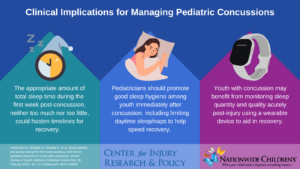Authors: Olivia VonDeylen, Enas Alshaikh, Krista Wheeler, Robyn Recker, Paola Malerba, Amy Valasek, Keith Owen Yeates, Jingzhen Yang
Why is this study important?
Researchers have found that when it comes to concussion recovery, sleep matters. In a study published in British Journal of Sports Medicine, researchers from Nationwide Children’s Hospital found that limiting daytime sleep and getting approximately seven hours of sleep each night in the first week after a concussion may speed up recovery.
“Youth who sleep more during the day or who sleep too much or too little each day may be at risk for slower concussion symptom resolution,” says lead author Jingzhen Ginger Yang, PhD, MPH, principal investigator in the Center for Injury Research and Policy of the Abigail Wexner Research Institute at Nationwide Children’s. “Good sleep hygiene, including limiting daytime sleep/naps and instead focusing on getting enough sleep at night, could help speed concussion recovery.”
How did the study go about this?
This study, conducted by experts in Nationwide Children’s Center for Injury Research and Policy, division of Sports Medicine, and Center for Biobehavioral Health, evaluated sleep quantity and quality in the first week after a concussion and explored the associations between sleep measures and concussion recovery in youth.
While some research on paediatric concussion has relied on self-reported sleep duration, this study used a wearable device to objectively measure sleep quantity (time in bed, total sleep time, and daytime sleep) and quality (sleep efficiency, wake after sleep onset, and number of awakenings) during the first week post-injury among youth aged 11-17 years with a physician-diagnosed concussion. This method captures total sleep time rather than just time in bed, providing a more accurate measurement of sleep duration.
What did the study find?
This study showed that youth with concussion may benefit from monitoring sleep quality. The relationship between sleep quantity and post-concussion symptom score is bidirectional during the first week post-injury, highlighting the importance of objectively measured sleep in this area of research.
What are the key take-home points?
Our results have important clinical implications for managing acute pediatric concussions:
- The appropriate amount of total sleep time during the first week post-concussion, neither too much nor too little, could hasten timelines for recovery.
- Paediatricians should promote good sleep hygiene among youth immediately after concussion, including limiting daytime sleep/naps to help speed recovery.
- Youth with concussion may benefit from monitoring sleep quantity and quality acutely post-injury using a wearable device to aid in recovery.
This study informs advice on proper sleep hygiene to assist in post-concussion recovery among youth. Clinical trials are necessary to determine the optimal timing, duration, and quality of sleep that support concussion recovery among youth.

Reference
VonDeylen O, Alshaikh E, Wheeler K, et al. Sleep quantity and quality during the first week postinjury and time to symptom resolution in youth with concussion. British Journal of Sports Medicine Published Online First: 26 February 2025. doi: 10.1136/bjsports-2024-109058